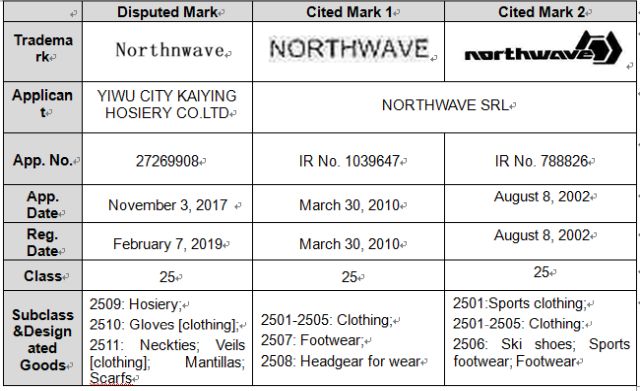Abstract
We, Kangxin Partners, P.C., filed an invalidation action against
the trademark, ![]() (No.27269908in
Class25) ("the disputed mark") on behalf of NORTHWAVE
SRL("Client") on February 2, 2024. The National
Intellectual Property Administration, PRC ("CNIPA")
examined the case and decided to invalidate the disputed mark for
registration.
(No.27269908in
Class25) ("the disputed mark") on behalf of NORTHWAVE
SRL("Client") on February 2, 2024. The National
Intellectual Property Administration, PRC ("CNIPA")
examined the case and decided to invalidate the disputed mark for
registration.
Background
NORTHWAVE SRL is the owner of the brand ![]() , global car enthusiasts like to abbreviate
Northwave as NW. It is the famous company focus on manufacturing
the bicycle accessories, it was founded in Italy in 1978 and has
been marketed worldwide for over 30 years. Today, NW has expanded
its reach to 45 countries, becoming one of the most renowned global
brands for bicycle accessories. Its product range includes
sunglasses, personal accessories, as well as a full line of cycling
apparel such as jerseys and shorts. The client was of the opinion
that the disputed mark is a "similar mark over similar
goods" compared with the client's mark
, global car enthusiasts like to abbreviate
Northwave as NW. It is the famous company focus on manufacturing
the bicycle accessories, it was founded in Italy in 1978 and has
been marketed worldwide for over 30 years. Today, NW has expanded
its reach to 45 countries, becoming one of the most renowned global
brands for bicycle accessories. Its product range includes
sunglasses, personal accessories, as well as a full line of cycling
apparel such as jerseys and shorts. The client was of the opinion
that the disputed mark is a "similar mark over similar
goods" compared with the client's mark ![]() and
and ![]() under international registration
No.1039647 and 788826, respectively. Upon communication with
client, we were entrusted to file invalidation against this
trademark.
under international registration
No.1039647 and 788826, respectively. Upon communication with
client, we were entrusted to file invalidation against this
trademark.
The comparison of the marks is listed as below:

Key Issues
In the invalidation, we mainly argued that:
1) The disputed party maliciously registered the trademark without the use intention, which constitutes obtaining the trademark registration by improper means and violates the principle of good faith. According to the relevant provisions of Articles 4, 7, and 44.1 of the Trademark Law, the disputed trademark should be declared invalid;
2) The disputed mark and the cited marks are "similar mark over identical or similar goods," in violation of Chinese Trademark Law, Article 30;
3) The cited marks obtained high reputation in China through use and promotion, and the registration and use of the disputed mark will easily cause confusion and misunderstanding amongst the relevant pubic.
On December 27, 2024, the CNIPA issued the decision: the disputed mark and the cited marks are similar, which can be hardly distinguished, thus constituting similar marks; the designated goods of the disputed mark and the designated goods of the cited marks have certain or close relevance, thereby constituting similar goods. Therefore, the co-existence of the disputed mark and the cited marks on the market will easily mislead consumers over origin of goods, which violates Article 30 of the Trademark Law. Considering that the client's trademark rights are already protected under other provisions of the 2013 Trademark Law, they did not examine the Article 44.1 of Trademark Law in this case.
Key Point of the Case
The key issue of this case is that 1) the disputed mark is a "similar mark" with the cited marks; 2) the goods of the disputed mark are similar to those of the client's cited marks, and 3)the disputed party maliciously registered the trademark without the use intention, which constitutes obtaining the trademark registration by improper means and violates the principle of good faith.
With respect to issue 1, obviously, the disputed mark is similar to the cited marks, because there is only one letter difference between the disputed mark and the cited marks, so they are similar in respect of composing letters, visual effect and pronunciation. The disputed mark and the cited marks do not have specific meanings, therefore they can't be distinguished from each other in meaning either.
With respect to issue 2, according to the Chinese Classification of Goods and Services, the goods of the disputed mark are not similar to the goods of the cited marks, because they fall in different subclasses. However, we hold there would be certain room to argue the goods connection of Class 25, and we have seen precedents that the CNIPA break the subclass principle and affirm the goods of different subclasses of Class 25 are similar goods. In addition, the disputed mark is highly similar to the client's marks, and we have use evidence to prove the reputation of client's marks, all of which strengthened our argument and successfully persuaded the examiner.
As for the claim of "bad faith", we noted the disputed party also filed other marks which copied and imitated other parties' marks with certain reputation, and the other party has ever filed the invalidation against the disputed party's other mark. However the CNIPA did not comment it, said that considering that the client's trademark rights are already protected under other provisions of the Trademark Law, the bad faith claims is not applicable in this case.
The content of this article is intended to provide a general guide to the subject matter. Specialist advice should be sought about your specific circumstances.


